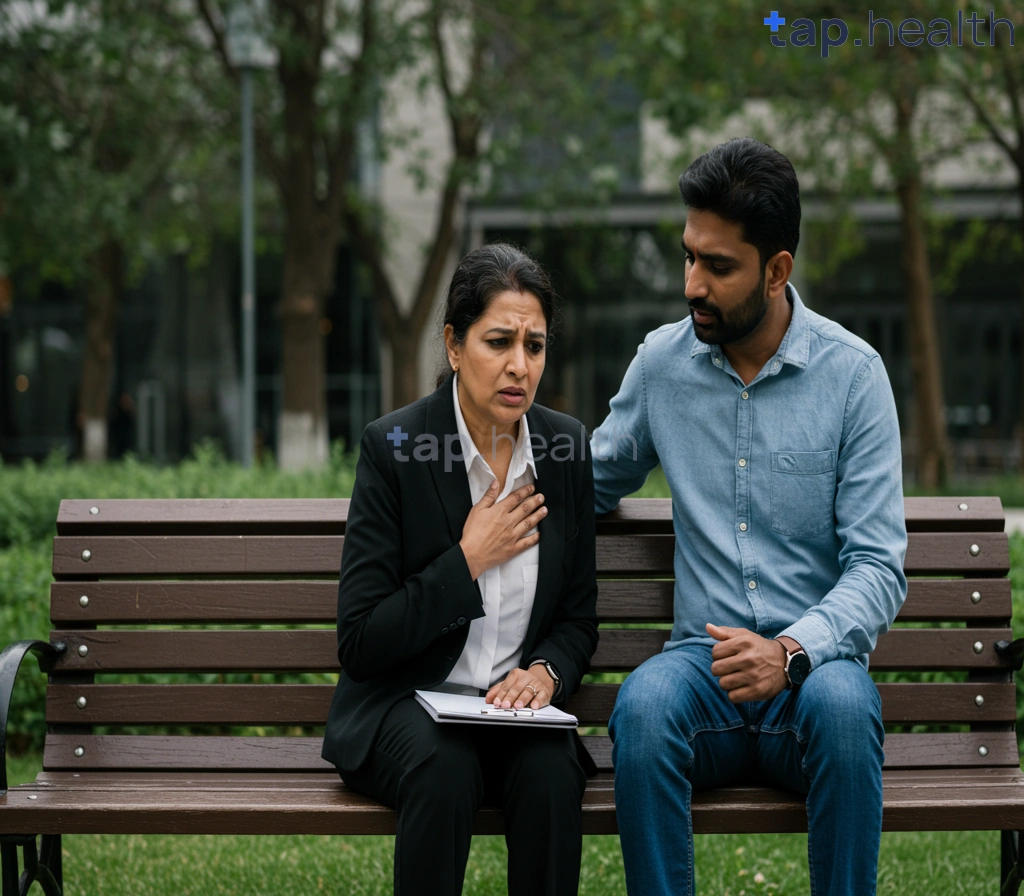Table of Contents
- Shortness of Breath & Diabetes: Recognizing Warning Signs
- Diabetes and Breathing Problems: When to See a Doctor?
- Difficulty Breathing with Diabetes: A Guide to Emergency Care
- Is Shortness of Breath a Diabetes Complication? Find Out Now
- Shortness of Breath and Diabetes: Understanding Your Risk
- Frequently Asked Questions
- References
Experiencing shortness of breath can be alarming, and even more so if you have diabetes. While some breathlessness is normal, understanding when it becomes a serious symptom linked to your diabetes is crucial. This blog post will explore the connection between shortness of breath and diabetes, helping you identify warning signs and understand when seeking immediate medical attention is necessary. We’ll cover common causes, risk factors, and what you can expect during a doctor’s visit. Let’s delve into Shortness of Breath and Diabetes: When to Seek Medical Attention.
Shortness of Breath & Diabetes: Recognizing Warning Signs
Shortness of breath, or dyspnea, can be a serious symptom, especially for individuals with diabetes. The risk is significantly heightened in tropical and Indian climates, where factors like humidity and infectious diseases can exacerbate existing conditions. Studies show that smokers with diabetes face a doubled mortality rate due to cardiovascular issues, highlighting the critical need for prompt medical attention when shortness of breath arises. This emphasizes the importance of recognizing warning signs and seeking timely help.
Understanding the Connection
Diabetes can damage blood vessels and nerves, affecting the heart and lungs. This damage can lead to various complications, including diabetic neuropathy (nerve damage) and diabetic cardiomyopathy (heart muscle damage). These conditions can manifest as shortness of breath, even during rest or mild exertion. In hot and humid climates prevalent in many parts of India and other tropical regions, the added strain on the cardiovascular system further increases the risk of breathlessness. Recognizing the symptoms early is crucial for effective management. For a more in-depth understanding of the respiratory system’s vulnerability, read our article on How Does Diabetes Affect the Respiratory System?.
Warning Signs to Watch For
Sudden onset of shortness of breath, especially if accompanied by chest pain, dizziness, or rapid heartbeat, requires immediate medical attention. Other warning signs include breathlessness during routine activities like walking or climbing stairs, wheezing, coughing, and persistent fatigue. If you experience these symptoms, particularly if you are a smoker with diabetes living in a tropical or subtropical climate, do not delay seeking medical advice. The risk of severe complications, including heart failure, is significantly elevated in these populations. Learning effective breathing techniques can sometimes help manage shortness of breath, but it’s crucial to consult a doctor if you experience any concerning symptoms.
Seeking Medical Help in India and Tropical Regions
In India and other tropical countries, access to quality healthcare can vary. However, prompt diagnosis and treatment are essential for managing shortness of breath linked to diabetes. Do not hesitate to contact your doctor, visit a local clinic, or seek emergency medical assistance if you experience any concerning symptoms. Early intervention can significantly improve outcomes and prevent serious complications. Remember, your health is paramount, and timely action can make all the difference.
Diabetes and Breathing Problems: When to See a Doctor?
Shortness of breath can be a frightening symptom, especially if you have diabetes. While many causes exist, it’s crucial to understand when shortness of breath warrants immediate medical attention, particularly in the context of prevalent diabetes in India and other tropical countries. A significant portion of the global diabetic population, 61% of those aged between 20-64 years and 39% aged 65+, as per the International Diabetes Federation, experience this concern, highlighting the importance of awareness and prompt action. This is further complicated by the impact diabetes can have on blood flow, as detailed in our article, How Does Diabetes Affect Blood Flow?.
Recognizing Dangerous Symptoms
Shortness of breath linked to diabetes can stem from various complications. These include diabetic ketoacidosis (DKA), a serious condition characterized by rapid breathing and fruity-smelling breath. Other potential causes are hyperosmolar hyperglycemic state (HHS), lung infections like pneumonia (more prevalent in humid climates), and heart conditions exacerbated by diabetes. Sudden onset shortness of breath, especially accompanied by chest pain, dizziness, or confusion, requires immediate medical attention. Similarly, worsening shortness of breath, despite managing your diabetes effectively, necessitates a doctor’s visit.
Seeking Help in Tropical Climates
In Indian and tropical countries, factors like heat, humidity, and potential exposure to infectious diseases can further complicate respiratory issues in people with diabetes. The increased susceptibility to infections necessitates extra vigilance. If you experience shortness of breath alongside other symptoms like fever, cough, or increased fatigue, do not delay seeking medical advice. Planning travel while managing diabetes requires careful consideration; see our guide, Traveling with Diabetes: Essential Tips for a Safe & Healthy Journey, for helpful tips.
When to Act
Don’t hesitate to contact your doctor or seek emergency medical care if your shortness of breath is severe, sudden, or accompanied by other alarming symptoms. Early diagnosis and treatment are critical in managing diabetes-related complications and improving your overall health. Remember, preventative care and prompt action are key to safeguarding your well-being, especially within the context of diabetes prevalence amongst the Indian and tropical populations. Schedule a check-up with your physician today if you have any concerns.
Difficulty Breathing with Diabetes: A Guide to Emergency Care
Understanding the Connection
Experiencing shortness of breath can be alarming, especially if you have diabetes. Diabetes significantly increases the risk of various respiratory complications. In fact, studies show a 70% heightened risk of sleep apnea and related sleep disorders in individuals with diabetes, often leading to breathlessness. This increased risk stems from several factors, including nerve damage (diabetic neuropathy) affecting breathing muscles and increased susceptibility to infections. Recognizing the potential link between diabetes and breathing difficulties is crucial for timely intervention.
When to Seek Immediate Medical Attention
Shortness of breath accompanied by other symptoms warrants immediate medical attention. In tropical and Indian climates, factors like humidity and air pollution can exacerbate respiratory issues. If you experience sudden breathlessness, chest pain, dizziness, or a rapid heartbeat, seek emergency care immediately. Don’t hesitate; these symptoms could indicate a serious underlying condition requiring prompt medical intervention. Consider calling your local emergency services or going to the nearest hospital. Early diagnosis and treatment are essential for managing complications related to diabetes and respiratory problems.
Actionable Steps
Maintain a healthy lifestyle: Managing your blood sugar levels effectively through diet and exercise, as well as managing your weight, can help reduce your risk of respiratory complications. Regular check-ups: Schedule regular appointments with your doctor for monitoring your blood sugar and overall health. Recognize warning signs: Be aware of symptoms like wheezing, coughing, and shortness of breath, and seek medical attention if you experience them. In India and other tropical regions, the high humidity and potential for infections can aggravate these issues, making prompt action even more critical. Remember, your health is paramount. Don’t delay seeking medical attention if you’re experiencing concerning symptoms. As you age, managing diabetes becomes even more crucial, so learning about the challenges and solutions of managing diabetes as you age can be beneficial. Furthermore, since diabetes can impact various organs, it’s also vital to prioritize your eye health. Learn more about protecting your vision with diabetes.
Is Shortness of Breath a Diabetes Complication? Find Out Now
Shortness of breath, or dyspnea, can be a frightening symptom, especially if you have diabetes. While not directly caused by diabetes itself, it can be a serious complication indicating underlying health issues. Diabetes significantly impacts productivity, leading to a 9-12% loss in work due to complications and absenteeism. This highlights the importance of recognizing and addressing potential complications promptly. Understanding the link between shortness of breath and diabetes is crucial for maintaining your health and well-being, particularly in hot and humid climates common in Indian and tropical countries where diabetes prevalence is high.
Recognizing the Warning Signs
Several diabetes-related complications can manifest as shortness of breath. Diabetic ketoacidosis (DKA), a serious condition where the body produces high levels of ketones, can cause rapid breathing and shortness of breath. Similarly, hyperosmolar hyperglycemic state (HHS), another severe complication, can also present with this symptom. Furthermore, underlying heart conditions, often exacerbated by diabetes, such as heart failure or coronary artery disease, can lead to shortness of breath, especially during exertion. In tropical climates, heat exhaustion can also worsen breathing difficulties in individuals with diabetes. Diabetes can affect many bodily functions, and sometimes these complications manifest in unexpected ways, such as with Can Diabetes Cause Loss of Taste and Smell?
When to Seek Immediate Medical Attention
Shortness of breath accompanied by other symptoms, such as chest pain, rapid heartbeat, confusion, excessive thirst, or frequent urination, requires immediate medical attention. Don’t hesitate to seek help if your shortness of breath is sudden, severe, or worsening, particularly if you are experiencing these additional symptoms. In Indian and tropical countries, access to timely healthcare can be crucial. Early intervention can significantly improve outcomes and prevent serious complications. It’s also important to be aware of other potential symptoms related to diabetes, like those discussed in Does Diabetes Cause Thinning Hair?.
Taking Proactive Steps
Regular check-ups with your doctor, including monitoring your blood sugar levels, are essential. Maintaining a healthy lifestyle, including a balanced diet, regular exercise, and managing stress, can help prevent complications and improve your overall health. Don’t ignore warning signs. Your health is paramount, especially given the significant impact diabetes complications can have on your productivity and quality of life. Contact your doctor or seek immediate medical attention if you experience shortness of breath, especially if you live in a hot and humid climate.
Shortness of Breath and Diabetes: Understanding Your Risk
Shortness of breath (dyspnea) can be alarming, especially for people living with diabetes. Women with diabetes are particularly at risk—they face about a 40% higher chance of developing heart disease compared to men, and heart disease is often linked to breathing difficulties.
In hot and humid climates, such as those in India and other tropical regions, the risk can be even greater. Dehydration, heat stress, and increased exertion can all make breathing problems worse. This makes it essential to understand the connection between diabetes and shortness of breath, and to recognize when it’s time to seek urgent medical help.
Recognizing the Warning Signs
Shortness of breath should never be ignored—especially if you have diabetes. Warning signs to look out for include:
-
Difficulty breathing during activity or even at rest
-
Chest pain or tightness
-
Rapid or irregular heartbeat
-
Dizziness or lightheadedness
-
Excessive sweating
In tropical climates, high heat and humidity can intensify these symptoms. Such warning signs may point to underlying cardiovascular or respiratory issues, and they require immediate medical attention.
Seeking Medical Help in Your Region
If you experience shortness of breath and have diabetes, don’t delay—contact your doctor or go to the nearest healthcare facility immediately.
In India and other tropical countries, where access to advanced healthcare may vary, it’s important to:
-
Identify a reliable hospital or clinic in your area that can handle heart and lung emergencies.
-
Keep an emergency plan ready, including how to get to the nearest facility quickly.
-
Stay proactive with regular check-ups, especially if you have other risk factors like high blood pressure, obesity, or high cholesterol.
Early detection and fast action greatly improve outcomes. In serious conditions, prompt treatment can save your life.
Living Safely with Diabetes
Managing your diabetes effectively is the best way to reduce the risk of complications that lead to shortness of breath. Focus on:
-
Keeping blood sugar under control
-
Following a heart-healthy diet
-
Staying hydrated, especially in hot climates
-
Exercising regularly but safely
-
Avoiding smoking and excessive alcohol
Final Thoughts
Shortness of breath in people with diabetes is more than just an uncomfortable symptom—it can be a sign of serious heart or lung problems. By recognizing early warning signs, seeking prompt medical care, and staying committed to diabetes management, you can greatly reduce your risks and protect your long-term health.
Frequently Asked Questions on Shortness of Breath & Diabetes
Q1. What is shortness of breath (dyspnea), and why is it particularly concerning for people with diabetes?
Shortness of breath is a serious symptom, especially for those with diabetes. Diabetes can damage blood vessels and nerves, leading to conditions like diabetic neuropathy and cardiomyopathy, which can cause breathlessness even at rest. This is further exacerbated in tropical climates due to humidity and increased risk of infectious diseases.
Q2. What are the warning signs of shortness of breath that require immediate medical attention?
Seek immediate medical help if you experience sudden shortness of breath, especially if accompanied by chest pain, dizziness, or a rapid heartbeat. Breathlessness during routine activities, wheezing, coughing, and persistent fatigue are also warning signs.
Q3. How does smoking affect the risk of shortness of breath and its consequences for people with diabetes?
Smoking significantly increases the risk of cardiovascular problems. For people with diabetes who smoke, the mortality rate from cardiovascular issues is doubled. This makes shortness of breath an even more serious concern.
Q4. What is the importance of early diagnosis and treatment of shortness of breath, especially in tropical climates?
Early diagnosis and treatment are crucial to prevent serious complications like heart failure. Access to healthcare can be limited in some tropical regions, so prompt action is especially important. While breathing techniques can help manage symptoms, they are not a replacement for professional medical care.
Q5. When should I consult a doctor about shortness of breath?
Consult a doctor immediately if you experience sudden or worsening shortness of breath. Don’t hesitate to seek medical attention if you have any concerns about your breathing, particularly if you have diabetes and live in a tropical climate.
References
- A Practical Guide to Integrated Type 2 Diabetes Care: https://www.hse.ie/eng/services/list/2/primarycare/east-coast-diabetes-service/management-of-type-2-diabetes/diabetes-and-pregnancy/icgp-guide-to-integrated-type-2.pdf
- What is Diabetes: https://www.medschool.lsuhsc.edu/genetics/docs/DIABETES.pdf



